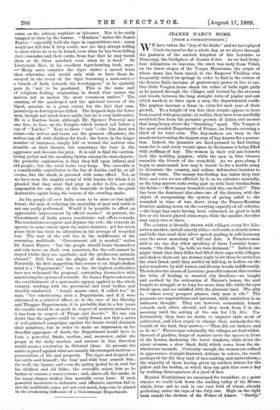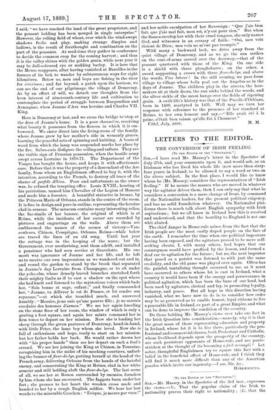W E have taken the " key of the fields," and
we have played l'ecole buissonare for a whole day, as we drove through the pastures of the ancient kingdom of fair Lorraine to Domremy, the birthplace of Jeanne d'Arc. As we had forty- four kilometres to traverse, the start was early from Vittel, on the lower slopes of the Vosges Mountains, the origin of whose name has been traced to the Emperor Vitellius, who frequently visited its springs in order to find in the waters of the Source Salee increase of gastronomic power to live to eat. Our little Vosgien horse shook his collar of bells right gaily as he passed through the -villages and trotted by the streams and woods, between the long straight rows of poplar and ash which marked, as lines upon a map, the departmental roads. The poplars increase a franc in value for each year of their growth. To a height of ten feet their trunks appear to have been coated with grey paint; in reality, they have been carefully scrubbed free from the parasitic growth of lichen and mosses that hang hoary above the " breathing" mark. The Vosges is the most wooded Department of France, its forests covering a third of its total area. The hay-makers are busy in the meadows harvesting the largest crop of hay known for a genera- tion. Indeed, the peasants are hard-pressed to find storing room for it, and every vacant space in the houses is being filled with stuffings of hay. The women in their red sun-bonnets look like nodding poppies ; while the men in blue blouses resemble the bleuets of the corn-field. As we pass along, I begin to understand how easy it would be for a hostile army to devastate the country, and reduce defenceless hamlets to heaps of ruins. The uneasy war-feeling has taken deep root here, and even we are affected by it, as we calculate mentally, as the long narrow carts swing past us with their burden from the fields,—" How many wounded:could this one hold P" This has been the dominant idea since one of the doctors, with the object of reorganising the system of giving relief to the wounded in time of war, drove along the Franco-Russian frontier, making notes on the carrying capacity of all vehicles, —the large hay-carts having been estimated as good to hold five or six blesses placed cross-ways, while the smaller charettets may carry two or three.
The country is literally strewn with villages, every five kilo- metres another, and all exactly alike,—red roofs, a church-tower and bells that send their silver speech pealing in soft harmony over the sweet monotony of hill and dale. A Frenchwoman said to me one day, when speaking of these Lorraine home- steads, " On dirait, La belle au bois dormant.' " Indeed, one might think that fairy folks had filled their caps with villages, and shaken them out one stormy night to let them be carried as the wind listed, until they settled on hill-top, in hollow, on the quiet meadows, by still waters and drowsy woods, indifferently. Therein lies the charm of Lorraine, peaceful content that carries• the balm of healing to wearied city dwellers,—as, taught and soothed by the reiteration of Nature's lesson, the soul forgets to struggle or to long for more than life, while the eyes dwell upon and are satisfied with the pleasant land. The pity is, " where every prospect pleases, only man is vile." The are superstitions and ignorant, while sanitation is an unknown thought. They are, however, economical, honest• towards each other, shrewd, and they work from 3 in the morning until the setting of the sun for 1 fr. 50 c. Un- fortunately, they have no desire to improve their mode of cultivation, and when urged to change their methods for the benefit of the land, they answer,—" Thus did our fathers, and so do we." Picturesque externally, the villages are foul within Instead of gardens, heaps of manure cover the spaces in front of the houses, darkening the lower windows, while down the street streams a slow black fluid, which oozes from the un- wholesome mounds. Curiously enough, the women are refined in appearance, straight-featured, delicate in colour, the result perhaps of the life they lead of lace-making and embroidering,- the majority of them having given up outdoor labour for the pillow mid the bobbin, at which they can gain four sous a day by working three-quarters of a yard of lace.
Beyond Nenfchateau we encamped for breakfast, at a point whence we could look down the smiling valley of the Meuse, which, from end to end, is one vast field of wheat, already goldening under the rays of the July sun. High on the right bank stands the cluiteau of the Prince of Alsace. "Surely," I said, "we have reached the land of the great proprietor, and the peasant holding has been merged in single enterprise." However, the rolling field of wheat, over which the wind-swept shadows frolic and play, making strange dimples and hollows, is the result of forethought and combination on the part of the peasants. At seed-time they gather in conference to decide the common crop for the coming harvest ; and thus .it is the valley shines with the golden grain, while next year it may be dull-coloured rye or nodding barley. It is here that the Meuse reappears, after having vanished at Bazoilles in the fissures of its bed, to wander by subterranean ways for eight kilometres. Below us, men and boys are fishing in the river for Ocrevisses ; and far beyond, a patch upon the horizon, we can see the end of our pilgrimage, the village of Domremy. As by an effort of will, we detach our thoughts from the keen interest of nineteenth-century life and cultivation to contemplate the period of struggle between Burgundian and Armagnac, when Jeanne d'Arc was heroine and Charles VII. King.
Here is Domremy at last, and we cross the bridge to'stop at the door of Jeanne's home. It is a poor chaumiere, receiving what beauty it possesses from the flowers in which it is em- bowered. We enter direct into the living-room of the family, where Jeanne grew by her mother's side in womanly graces, learning the peaceful arts of spinning and knitting. A beam of wood from which the lamp was suspended marks her place by the fire. Sabre: cuts disfigure the ceiling and rafters. They are the visible sign of Prussian possession, when the hostile army swept across Lorraine in 1870-71. The Department of the Vosges has bought the house, and keeps it with affectionate care. Before that it was the property of a descendant of the Arc family, from whom an Englishman offered to buy it, with the intention, according to the French, to destroy all trace of the shame of perfide Albion. Poor and unfortunate as the owner was, he refused the tempting offer. Louis XVIII., hearing of his patriotism, named him Chevalier of the Legion of Honour and made him a forester. A beautiful statuette in bronze, by the Princess Marie of Orleans, stands in the centre of the room. It is fine in design and pure in outline, representing the heroine clad in armour. The museum contains many interesting relics, the fac-simile of her banner, the original of which is at Reims, while the incidents of her career are recorded by pictures and engravings on the walls. Above them are emblazoned the names of the scenes of victory—Van- c onleurs, Chinon, Compiegne, Orleans, Reims—while below are traced the lines of an old song. Until last year the cottage was in the keeping of the nuns ; but the Government, ever secularising, sent them adrift, and installed a pensioner who had seen service at Gravelotte. His one merit was ignorance of Jeanne and her life, and he left us to receive our own impressions as we wandered out and in, and round the garden to stand by the brook that separated in Jeanne's day Lorraine from Champagne, or to sit under the yoke-elm, whose densely leaved branches stretched forth their mighty limbs as if to cast a shadow on the spot where she had knelt and listened to the mysterious voices which bade her, " Sois bonne et sage, enfant ;" and finally commanded her, " Jeanne, va delivrer le roi de France, et lui rendre son royaume,"—at which she trembled much, and answered humbly: " Messire, je ne anis qu'une pauvre fille ; je ne saurais conduire des hommes d'armes." We see her again kneeling on the stone floor of her room, the window of which is only a grating a foot square, and again her saints command her in firm tones to depart on her mission. Now she is leading her sheep through the green pastures of Domremy, hand-in-hand, with little Peter, the lame boy whom she loved. Now she is full of enthusiasm and hope, ready to start on her mission, but her father holds her back. He would rather drown her with "his proper hands" than see her depart on such a fool's errand. We see her joining the King at Chinon, in Tonraine, recognising him in the midst of his mocking courtiers, unfurl- ing the banner of fleur-de-lys, putting herself at the head of the French army, delivering Orleans from the hands of the hateful enemy, and consecrating the King at Reims, clad in her white armour and still holding aloft the j/eur-de-lys. The last scene of all, we see her at Rouen surrounded by enemies, forsaken by him whom she has succoured. The faggots burn under her feet ; she presses to her heart the wooden cross made and handed to her by a rough English soldier. We hear her last words to the miserable Cauchon " Eveque, je mews par vous !"
and her noble exculpation of her Sovereign : " Que j'aie bien fait, que j'aie mal fait, mon roi, n'y est pour rien." But when the flames envelop her with their cruel tongues, she only names God, and witnesses in an ecstasy of faith : " Oni, mes voix etoient de Dieu ; mes voix ne m'ont pas trompee."
With many a backward look, we drive away from the quiet village of Domremy, and as we go the sun strikes on the coat-of-arms carved over the doorway,—that of the peasant quartered with those of the King. On one side is a shield with three ploughshares ; on the other, a sword supporting a crown with three fleur-de-lys, and above the words, Vive labeur ! In the still evening, we pass from village to village whose bells peal out the Angelus as in the days of Jeanne. The children play in the streets, the lace- makers sit at their doors, the sun sinks behind the woods, and the silver sickle of the moon hangs over the fields of ripening grain. A swift life's history was that of the Pucelle d'Orleans, born in 1409, martyred in 1431. Well may we turn her response with reference to the presence of her standard at Reims, to her own honour and say,—" Elle avait ete n la peine, c'etait bien raison qu'elle fat n l'honneur."



































 Previous page
Previous page